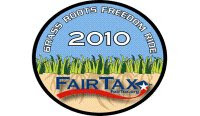Everyone who wants one, has a job. The economy is booming!
Corporations are moving their headquarters and manufacturing back to the USA.!
We get to keep 100% of our paycheck!
Social Security is on stable footing for the first time in years!
Medicare is paying its own way and is no longer in danger of default!
The Corporate taxes and costs of compliance hidden in both wholesale and retail prices no longer exist!
We love our monthly prebate check! The lower income people pay no taxes because of this and the rest of us get a free ride up to the amount of the poverty level!
This means we can save more, faster and have more money available for education, home ownership and retirement!
We don’t have to fill out those stupid IRS forms anymore! We save a total of $250 billion or more (about 3% of the GDP).
The government wins too! They get the same amount of revenue they are used to getting!
And guess who has to start paying taxes for the first time in their lives? Illegals, prostitutes, drug dealers, the porn industry, criminals, plus all of the other under-the-table transactions that take place!
Then comes the repeal of the 16th amendment – when we are sure we get the kind of FairTax we want!
Do you know what we have done? We have eliminated the IRS as we know it. No more audits (except for businesses), no more nasty letters, no more high-handed tactics!
NOW DO YOU KNOW WHAT THIS MEANS? THIS MEANS THAT APRIL 15TH WILL BE “JUST ANOTHER SPRING DAY”!
Monday, September 17, 2007
LET’S PRETEND WE HAVE THE FAIRTAX NOW!
Subscribe to:
Post Comments (Atom)

4 comments:
Thank you for the thought-provoking post! I love it!
The FairTax Act represents a "cultural sea-change." It lays out a practical ideal of voluntary payment, based on a substantial level of taxpayer choice that the plan affords. Since FairTax untaxes basic necessities (up to socially-accepted levels of poverty-level spending), what is taxed is marginal, and/or desired or preferred, on a broader base of retail products and services. This is to say that the taxpayer may, under the FairTax, choose to purchase used products and avoid paying the tax. And, to the extent desired, the taxpayer may choose to self-perform certain services rather than pay for them. This could stimulate do-it-yourself education, improve citizens' self-reliance; indeed the FairTax represents the possibility to usher in a new can-do, citizen psychology that would accrue to greater demands for government accountability - truly, a cultural sea change!
It's become quite cliche for those, who have failed to investigate its underpinnings, to call the idea of a "fair tax," an oxymoron. It sounds catchy, but it is not true. The reality is that government is the "necessary glue" that enables the the social fabric to cohere. It does this by effecting "rules" that ostensibly provide members with equitable access to wealth and resources. It also must provide ostensibly equitable enforcement of those rules in order to mitigate threats to the social fabric. It is unrealistic to believe that the structures of a national government can be voluntary, thus the need for funding. The idea of fairness has to do with equitable sharing in the cost by all members who depend upon the social fabric for food, shelter, clothing and post-necessity economic enterprise. And, because of the shift of power discussed above, government will find it more difficult to both enlarge the government, and implement a dual system. FairTax strategist, Dennis Calabrese, discusses how the FairTax repeals the income tax, how it does away with the IRS, and how it addresses other aspects of frequent concern to skeptics.
The FairTax has a much greater opportunity for success to operate as a "self-regulating" mechanism because of increased visibility. One finds that the current system, ostensibly regulated by the Tax Code, is in fact poorly regulated because of continually increasing complexity (tax favors from politicians through lobbyists to corporations and other special interests) stemming from the desire by those holding government position to steer public behavior using tax code "carrots." We have seen how almost 90 years of this type of behavior has eroded the nation's currency and the purchasing power of working family incomes. "Visionist," Tom Frey believes the current tax system will simply collapse; and economist Laurence Kotlikoff heralds an unavoidable economic breakdown given the latitude granted to government power under the current system. Kotlikoff believes that passage of the FairTax can stave off the economic ruin we're facing, but would be surprised to see it happen.
Frey and Kotlikoff may be right on both counts, and we may not be able to successfully evoke change; but shall we not try?
Thanks for the input Ian. You sent us some interesting stuff to chew on yourself!
Bobbie
Once again, it would be difficult to top Ian's response. I repeat a previous comment at another site.
I'm sure that a large number of individuals tried to convince the founders of this country not to 'rock the boat'. Had the less informed won, we would still be subjects of England. Change, as difficult as it can be, is often the answer. We can not survive under the current system. The process of our demise into socialism is slow and most people have not noticed. I am not a fanatic, just a realist. Our government has taken on the role of Robin Hood. When the rich run out of funds, we will all be poor because we didn't look to the source of funds...productivity.
You certainly got that right, Dee. I agree - we need to get our government under control and the FairTax will do just that!
Post a Comment